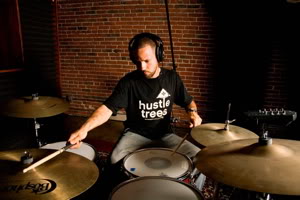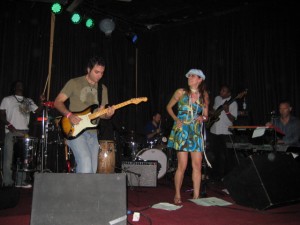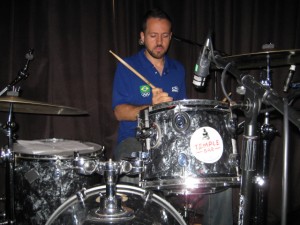
Crafts And Arts
When I teach, and in my own musical evolution, I have a guiding principle: Learn the instrument and the rest is concept. Like any workable Guiding Principle it is simple at its surface and wide enough to cover a lot of ground. Its depth is its substance. The basic idea is that the instrument is the medium and music is the canvas. Pick a metaphor, really. Essentially, as it relates to teaching, my intention is to develop drummers and musicians; not so-called rock drummers or jazz drummers for instance. Address the drumset first and apply concept to adapt and thrive in all musical styles and settings. Simple at the surface.
Musical Ethnology
In my own playing this principle has kept me open-minded and open-eared and I’ve found it relatively smooth to transition on the instrument conceptually when entering varied musical environments or exploring different styles. But developing concept is no simple matter. When I first discovered the modern Klezmer music coming out of New York’s avant garde and then the traditional stuff from Eastern Europe, for instance, it was a musical culture shock. I just never heard music and drumming that way before. There were foreign codes.
The plain fact that music emerges out of cultures bespeaks the complex challenge of effectively understanding—conceptualizing—musical styles. Try assimilating in Paris after a semester of French Lit. Try playing Klezmer convincingly after digging a few old records. Personally, I put considerable time into digesting and shedding the concepts and gained a working fluency. Added it to the bag. Still, it tested my simple principle. Concept is deep, man.

Language Barrier
When I first moved to L.A. and became exposed to the killing Brazilian music and—naturally—musicians here, besides an instant attraction, I sensed the same cold-sweat building that I remembered from the first Klez record. I felt this music on a deep level; I didn’t really understand it. I couldn’t sit-in on the gig. It made me a bit nervous. This clearly wasn’t simply about making the grooves feel good. This was a new language. Same tongue, different concept.
Leo Costa speaks it brilliantly. A Carioca (Rio de Janeiro native), his father led a samba school and Leo (pronounced [Lay’-oh]) was immersed in the culture and traditions of Brazilian drumming from a young age. He so happened to be good. With a growing affinity for American music, he moved to Boston to attend Berklee before settling in L.A. Leo understands the power of Concept, and is a fully-rounded drummer and musician.
The Rio Deal
I first heard him with L.A.’s omnipresent Carioca ambassador, the exemplary and lovely Katia Moraes and her group Pure Samba. It was immediately evident that this cat was For Real. I had to laugh at what passed for Brazilian drumming at my own fancy music school. It was equivalent to making it through Chapin’s Advanced Techniques book and thinking you could play jazz.
I hadn’t taken a drumset lesson since college. I soon called Leo. I wanted to learn this stuff from the source. In a handful of lessons I learned more about authentic Brazilian drumming than I had in all the years before. Put it in the bag.
Now I like to go check Leo out when I can. Soak-in that concept. He was playing Zanzibar in Santa Monica last night with a group called Muamba and I was free. Done.

Samba School
Zanzibar is a walk-down music venue and dance club with a lounge-y Bedouin motif, over-priced whiskey, and a positively batshit staff on this night. The stage and PA are good and they bring in a decent roster of live Brazilian, salsa and world-rhythm bands. Just bring a flask. Special shout goes out to opener Quetzal Guerrero’s self-named band, Quetzal. They were tight, groovy, and authentic Afro-Brazilian goodness.
Muamba took the stage nearing midnight. Also tight and groovy, but in a more “Brickhouse” kind of way. It was bigger, less intimate, and pop-ier than the soulful Quetzal. There wasn’t a whole lot of conceptualizing to be done hearing Leo in this setting, but it was still decidedly Brazilian-leaning and Leo is consistently a joy to watch and hear. With deceptively stiff-looking technique at times, he is relaxed, in control and musically present. And, man, can this guy bust out some serious right hand 16ths—a hallmark of Brazilian drumming. He also has serious feel—a hallmark of good drumming.
On Words
The craft can be taught. The art is more elusive. Aspects of art are innate; conceptual; pursued and earned; and cosmic. Define it how you will. Or don’t. It’s all words. You’ll know it when you hear it. I heard some last night.
Now for some pandeiro lessons…

Very cool. Obrigada (thank you)
: )